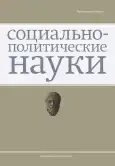Confucius Institute in St Petersburgas a Soft Power Tool in the Context of the “One Belt, One Road” Initiative
- Authors: Qu C.1
-
Affiliations:
- St. Petersburg State University
- Issue: Vol 12, No 2 (2022)
- Pages: 134-148
- Section: Articles
- URL: https://journals.eco-vector.com/2223-0092/article/view/535846
- DOI: https://doi.org/10.33693/2223-0092-2022-12-2-134-148
- ID: 535846
Cite item
Abstract
In today’s world, the process of global economic integration has accelerated, and the integration of the world’s countries in the political, economic and cultural fields has further deepened. Language is not only a tool of communication that allows countries to understand each other, but also an important component of national “soft power”. Today, “soft power” is increasingly included in the foreign policy strategies of states, which has a positive impact on their internal development and contributes to the spread of their influence on other countries. As the Chinese language and culture become more and more popular abroad, interest in the Chinese language is growing among Russians as well. The promotion of Chinese culture and language in St. Petersburg, Russia’s second largest city and the center of the western part of the country, is especially important. The Confucius Institute in St. Petersburg was chosen for this work. Based on a theoretical analysis of the concept of soft power, the article begins with the Confucius Institute as a tool for developing soft power. It analyzes the opportunities and challenges facing the Confucius Institute in St. Petersburg through case method, comparative analysis, and literature search, and then suggests countermeasures for the Confucius Institute’s intercultural communication in countries along the “One Belt, One Road”. From this the author concludes that the success of the Confucius Institute in St. Petersburg is inseparable from the political, economic and cultural support of Russia and China, but its development is also accompanied by problems in systems and politics.
Keywords
the concept of soft power, traditions of the West and the East, values of the West and the East, problems of cross-cultural communication, possibilities of creating a system of soft power in world practice, the “One Belt, One Road” initiative, Confucius Institute, environment and status, support, suggestions for improvement
Full Text
About the authors
Chang Qu
St. Petersburg State University
Email: st073275@student.spbu.ru
postgraduate student at the Department of International Relationships and World Politics St. Petersburg, Russian Federation
References
- Kostyrev A.G. “Reasonable force”, public diplomacy and social networks as a factor in international politics. Polis. 2013. No. 2. P. 144. (In Rus.)
- Pestsov S.K., Bobylo A.M. “Soft power” in world politics: The problem of operationalization of the theoretical concept. Bulletin of the Tomsk State University. History. 2015. No. 2 (34). P. 108. (In Rus.)
- Nye J.S., Jr. The future of power. Transl. from English. V.N. Verchenko. Moscow: AST, 2014.
- McClory J. The new persuaders: An international ranking of soft power. The Institute for Government. P. 3.
- Kim V.S., Bohan Ya.A. Transformation of the PRC’s “Soft Power” strategy in modern conditions. Bulletin of Chelyabinsk State University. Political Sciences. Oriental Studies. 2012. No. 12. Pp. 17-20. (In Rus.)
- Ponkin I.V. Technologies of “soft power” as a means of dysfunctionalization and destruction of the state. Law and Education. 2014. (In Rus.)
- Frolova O.A. “Soft Power” of US Foreign Policy: Institutions and formation mechanisms. Bulletin of Peoples’ Friendship University of Russia. Series: Political Science. 2013. (In Rus.)
- Pai J.S. Flexible power. How to Succeed in World Politics. Novosibirsk; Moscow: Trends, 2006. P. 34.
- Dolgov B.V. “Soft” and “hard” power of Europe in the Near and Middle East. Actual Problems of Europe. 2014. No. 3. P. 21. (In Rus.)
- Glaser B.S., Murphy M.E. Soft power with Сhinese characteristics the ongoing debate. In: Chinese soft power and its implications for the United States. P. 14.
- Sheng Ding. Soft power and the rise of the China: An assessment of China’s soft power in its modernization process // The State University of New Jersey. P. 87.
- Sun Mingxing. The state of development and counteraction to the development of trade between China and Russia. Colloquium-Journal. 2020. No. 8-5 (60). Pp. 35-37.
- Wang Ting, Idrisov Sh.A. Russian-Chinese cross-border e-commerce in the coordinate system “One Belt, One Road”. Financial Economy. 2019. No. 11. Pp. 223-229.
- Mayor of St. Petersburg: Cooperation between St. Petersburg and China takes on a whole new level. RIA Novosti. (In China) URL: http://sputniknews.cn/economics/201805241022547 (data of accesses: 22.01.2022).
- Arefiev A. Learning Chinese in Russian schools. Center for Sociological Research of the Ministry of Education and Science of Russia. 2013. P. 78. (In Rus.)
- Do St. Petersburg schoolchildren need Chinese. St. Petersburg Bulletin. (In China) URL: https://spbdnevnik.ru/news/2016-04-27/nuzhen-li-peterburgskim-shkolnikam-kitayskiy-yazyk (data of accesses: 01.02.2022).
- Samoilova M.P., Lobanova E.A. Legal regulation of the activities of Confucius Institutes in Russia. Juvenis Scientia. 2017. No. 6. Pp. 29-31. (In Rus.)
- Confucius Institute opens in St. Petersburg. Delovoy Petersburg. ISSN 1606-1829. (Online) with reference to the press service of St. Petersburg University. August 28, 2007.
- Confucius Institute Headquarters / China Hanban. Confucius Institute Annual Development Report. 2013. (In China)
- Yu Wei, Zhang Hua. Beautiful article (first half of the month). 2020. No. 1. Pp. 124-130. (In China)
Supplementary files











